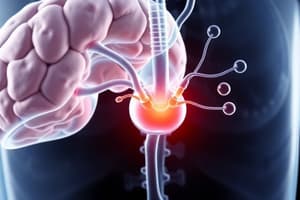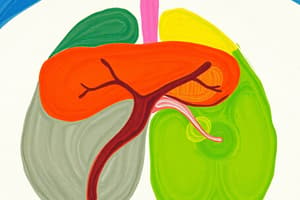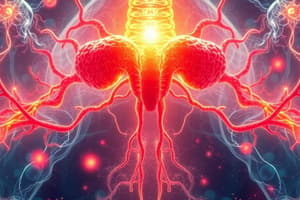Podcast
Questions and Answers
What is the main function of Prolactin (PRL)?
What is the main function of Prolactin (PRL)?
- Stimulates growth and cell reproduction
- Stimulates breast milk production postpartum (correct)
- Stimulates uterine contractions during labor
- Regulates water balance in the body
Which hormone regulates water balance by increasing water reabsorption in the kidneys?
Which hormone regulates water balance by increasing water reabsorption in the kidneys?
- Oxytocin
- Antidiuretic hormone (ADH) (correct)
- Growth hormone (GH)
- Prolactin (PRL)
What is the primary role of Growth Hormone (GH)?
What is the primary role of Growth Hormone (GH)?
- Regulates water balance in the body
- Stimulates growth and cell reproduction (correct)
- Stimulates uterine contractions during labor
- Stimulates breast milk production postpartum
Which disorder is caused by excessive growth hormone production?
Which disorder is caused by excessive growth hormone production?
What is the role of the posterior pituitary gland?
What is the role of the posterior pituitary gland?
Which hormone is responsible for stimulating uterine contractions during labor?
Which hormone is responsible for stimulating uterine contractions during labor?
Where is the pituitary gland located?
Where is the pituitary gland located?
What is the other name for the pituitary gland due to its influence on other hormone-producing glands?
What is the other name for the pituitary gland due to its influence on other hormone-producing glands?
Which part of the pituitary gland produces hormones that stimulate the growth and function of other endocrine glands?
Which part of the pituitary gland produces hormones that stimulate the growth and function of other endocrine glands?
Which hormone stimulates the thyroid gland to produce thyroid hormones?
Which hormone stimulates the thyroid gland to produce thyroid hormones?
What does Adrenocorticotropic hormone (ACTH) stimulate?
What does Adrenocorticotropic hormone (ACTH) stimulate?
What is the function of Follicle-stimulating hormone (FSH)?
What is the function of Follicle-stimulating hormone (FSH)?
Flashcards are hidden until you start studying
Study Notes
Endocrine Glands: Understanding the Pituitary's Central Role
Endocrine glands are a collection of specialized organs that play a crucial role in our bodies by producing hormones, which regulate various functions. These glands communicate with virtually every system, maintaining a delicate balance of growth, metabolism, and reproduction. One of the most important endocrine glands is the pituitary gland, often called the "master gland" due to its influence on other hormone-producing glands.
The Pituitary Gland's Structure and Location
The pituitary gland, about the size of a pea, is located in the skull, at the base of the brain, beneath the hypothalamus. It's divided into two distinct parts: the anterior pituitary (adenohypophysis) and the posterior pituitary (neurohypophysis).
Hormone Production and Regulation
The anterior pituitary produces hormones that stimulate the growth and function of other endocrine glands. It secretes six major hormones:
- Thyroid-stimulating hormone (TSH): Stimulates the thyroid gland to produce thyroid hormones.
- Adrenocorticotropic hormone (ACTH): Stimulates the adrenal cortex to produce cortisol and other hormones.
- Follicle-stimulating hormone (FSH): Promotes the growth and maturation of ovarian and testicular follicles.
- Luteinizing hormone (LH): Regulates the development of the corpus luteum in the ovaries and stimulates testosterone production in males.
- Prolactin (PRL): Stimulates breast milk production postpartum.
- Growth hormone (GH): Stimulates growth and cell reproduction.
The posterior pituitary gland does not produce hormones itself; instead, it stores and releases hormones produced by the hypothalamus:
- Antidiuretic hormone (ADH): Regulates water balance by increasing water reabsorption in the kidneys.
- Oxytocin: Stimulates uterine contractions during labor and milk ejection from the breast.
Hormone Regulation
The pituitary gland's hormone production is regulated by the hypothalamus and target glands. Hormone-releasing factors produced in the hypothalamus are carried into the anterior pituitary via small blood vessels. These factors stimulate or inhibit the production of pituitary hormones.
Clinical Relevance and Disorders
Disorders affecting the pituitary gland can lead to hormonal imbalances, causing a variety of symptoms and health complications. Some common disorders include:
- Pituitary adenomas: Benign tumors that may compress other pituitary structures, leading to hormonal imbalances.
- Acromegaly: A condition caused by excessive growth hormone production, resulting in abnormal growth of bones, cartilage, and soft tissues.
- Cushing's disease: A condition resulting from overproduction of cortisol, causing weight gain, high blood pressure, and easy bruising.
- Hypopituitarism: A condition in which the pituitary gland does not produce enough essential hormones, leading to various symptoms.
Understanding the complex interactions and roles of the pituitary gland is essential for maintaining optimal health and treating disorders involving this vital endocrine organ.
Studying That Suits You
Use AI to generate personalized quizzes and flashcards to suit your learning preferences.




